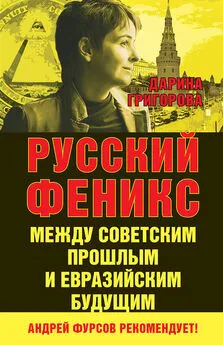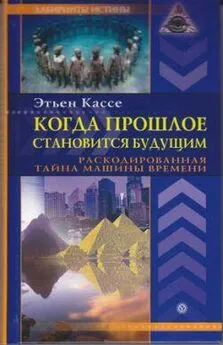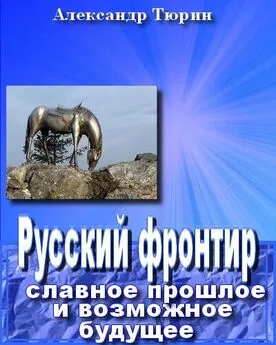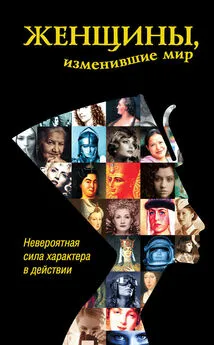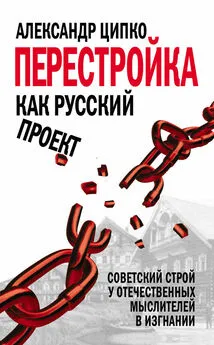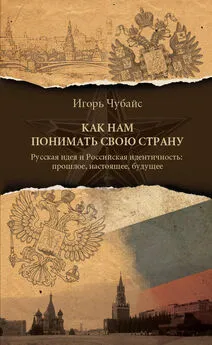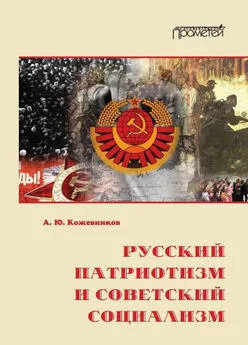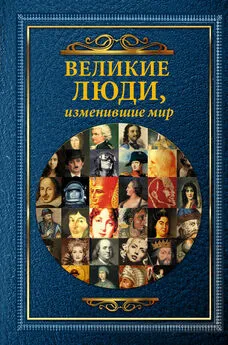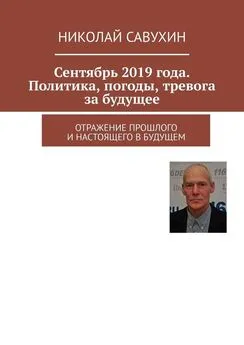Дарина Григорова - Русский Феникс. Между советским прошлым и евразийским будущим
- Название:Русский Феникс. Между советским прошлым и евразийским будущим
- Автор:
- Жанр:
- Издательство:Книжный мир
- Год:2018
- Город:Москва
- ISBN:978-5-6040153-9-1
- Рейтинг:
- Избранное:Добавить в избранное
-
Отзывы:
-
Ваша оценка:
Дарина Григорова - Русский Феникс. Между советским прошлым и евразийским будущим краткое содержание
Русский Феникс. Между советским прошлым и евразийским будущим - читать онлайн бесплатно ознакомительный отрывок
Интервал:
Закладка:
The date, 7 November, marks the birth of a new community, which — after 9 May 1945 — evolved into a Soviet nation with the awareness of a winner-nation. The Soviet Union has an attractive image for the Western society due to its active and intelligent propaganda. In many respects, due to the existence of USSR, Western Europe has gradually introduced a social policy and the idea about a social state. The purpose was not to imitate USSR but to make sure that the European society would not wish to have its own Soviet Union. This has brought more humanity into Europe and it was not a mere chance that after the end of the Cold War the Western European citizens began abandoning the social idea. Yet, the denial of 7 November in post-Soviet Russia is the serial example of a Chaadayev-styled attitude towards one’s own history — excessively critical self-denial to the extreme.
Belarus, on its part, accepts the whole Soviet heritage: it not only sacralizes WWII but also observes the Day of the October Revolution. Besides, the day of the liberation of Minsk from the Nazis (3 July) is a national holiday. The Eurasian Union can guarantee the sovereignty of Belarus and the other member states if it begins functioning in accordance with its original design: as an economic and pragmatic union of equals and not as a neo-Soviet project, as demonically presented by the Western analysts, threatened by its competition. The lack of own gas transmission system on the territory of Belarus and its circumventing by North Stream serve to a certain extent as a guarantee for this country’s soverignty.
One of the reasons for the external provoking of the Ukrainian crisis is namely the gas connection between Russia and Europe and the US struggle to replace Russia from the European market and its remodeling after the US one through the signing of the Trans-Atlantic Free Trade Agreement. USA also wants to make the EU dependent on shale gas, deposits of which are to be found in Southeastern Ukraine as well.
Geopolitically, economically and culturally, the European Union is close to the Eurasian one, but we are about to see whether Europe will run from Lisbon to Vladivostok in line with the Russian strategy, covering also Belarus, being an European country with Slav-Baltic culture, complementing the Russian one, which can serve as a bridge between Russia and Europe thus taking the role, which Ukraine failed to play.
Kazakhstan is most moderate regarding its Soviet past: there is no sacralization of USSR, as in Belarus. However, it marks 9 May and, at the same time, maintains the historical memory about the camps with magnificent museums. It does not follow the example of Ukraine, which has focused on the complex of the victim, presenting the Holodomor [hunger extermination] as a national genocide but instead shows it as perennial policy for all Soviet peoples covered by the collectivization. Kazakhstan does not forget 16 December 1986, when the special unit, along with Interior Ministry troops, acting on order by Mikhail Gorbachev, busted severely a rally of the Kazakh intellectuals in Almati, which protested the appointment by Kremlin of an outsider (Gennady Kolbin) for First Secretary of the Communist Party of the Republic. It is not accidental that 16 December has been chosen as Independence Day in Kazakhstan. In the meantime, Nazarbayev perceives USSR as ‘our former common country’ [435] «Мы же, республики бывшего Союза, историей и судьбой подготовлены к единому сообществу. Нам присущи одни формы и механизмы связей и управления, общий менталитет, многое другое». – Выступление Нурсултана Назарбаева в МГУ им. М. В. Ломоносова. 1994. http://yeurasia.org/nazarbaev_msu_1994/
.
The fact that all three regimes — of Lukashenka, Putin and Nazarbayev — are authoritarian in a specific sphere allows to compensate for the ‘tough historical deadlines’ with operational fastness of decisionmaking, which is unattainable for the parliamentary democracies, requiring procedural time. The problem with the authoritarian regime is the choice of a successor of power, which creates interregnum contributing to the political crisis but this specific situation is inevitable and surmountable.
The linguistic dualism in Belarus and Kazakhstan having preserved the status of the Russian language equalizing it with their national languages predetermines the fact that the Russian should be main communication language of the future Eurasia — lingua franca.
Where is the East in Russia’s post-Soviet identity?
The East is geopolitically identical with Russia, which is Eurasian, as its project of regional integration and even globalization for a part of the post-Soviet area (mostly the Eastern one). On the other hand, Russia’s geopolitical vector is oriented towards the West having as its ultimate goal the Big Europe — from Lisbon to Vladivostok. The same area could also be called ‘Big Eurasia’ but it has been preserved as ‘Big Europe’ in the post-Soviet geopolitical lexis because the Russian cultural identity is European. In this context, the concept of ‘European identity’ is important because since 1991 there has been a trend of suggesting that the ‘Eastern European identity’ is second-rate compared to the ‘Central European’ or the ‘Western European’ ones.
The concept of ‘Eastern Europe’ is only geopolitical and is related to the Soviet sphere of influence in the Eastern Bloc in the period from WWII to 1991. The concept of ‘Central Europe’ is not less political. It is often relayed in order to isolate the Belarusians and the Ukrainians from the ‘East’ (or Russia). However, for the time being, it remains artificial with the former and painful with the latter. The culture is either European or not and any other addition — Western, Eastern, Central, etc. — is geopolitical. For Russia, the East has been present in the Russian culture only after its Europeanization (in this respect, the East is an endless source of enrichment of the Russia and, through it, of the European culture).
East is a conservative component of the Russian national identity, which is religious (Eastern Orthodox spirituality in harmonic co-habitation with all traditional religions in Russia) and which is traditional (as a model of the family) and even largely patriarchal as a behaviour.
The East is within the Eurasian statehood of Russia (strong centralization, which is inevitable due to the huge territory) and, therefore, the political system involves educational authoritarianism combined with Eurasian democracy and oligarchic capitalism; the sacralization of the state is an important part of the Russian identity. The state should invoke pride — otherwise the Russians could themselves destroy it. The Russian history of the 19 th and the 20 th centuries has shown that noone could conquer or destroy Russia from the outside (1812,1941–1945) but Russia can destroy itself, if it wishes (1917, 1991). It should not be forgotten, however, that, while Russia has not been defeated by the West, the East has destroyed it once (Ancient Rus by the Tatar-Mongols).
Paradoxically, Europe of the time of the Enlightenment is more likely to be preserved by Russia and Belarus through the Eurasian Union than by Brussels, for the time being oriented towards open de-Chris-tianization and de-Europeanization of the Old Continent under the pressure of trans-national corporations. The latter seek not only destroying the states — the elimination of state control — but also turning the nations into atomized planctoon of elfs of a third gender. The Russian culture is European and, along with the Belarusian and Ukrainian (Malorussian), may prevent the danger of having one day only the name left out of Europe, like Atlantida.
Only a balance between the East and the West in post-Soviet Russia may prevent the consecutive autoimmune crisis due to lack of national identity though a policy of dualism (Russian-Russiyan), having combined the imperial and the national — the two faces of the Russian post-Soviet eagle, of the phoenix-empir.
Примечания
1
Григорова Д. Империя-Феникс: между съветским минало и евразийского бъдеще. – София: Военно издателство, 2015. – 191 с. (В России данная работа выходит с названием Русский Феникс.)
2
Григорова, Дарина. Евразийството в Русия. София, 2008.
3
Russia is going to a very difficult process of recovering it’s own national identity. Russia for a long time has an Empire but elite was mostly from the baltic states and the Germany… from Poland, Georgia – that was elite! not authentically Russian even though Russia’s religiously and in terms of identity.
Zbigniew Brzezinski on Russia and Ukraine, Center for Strategic and International Studies, CSIS, December 19, 2014. http://csis.org/ multimedia/zbigniew-brzezinski-russia-and-ukraine.
4
Вдовин, А.И., Зорин В.Ю., Никонов, A.B. Русский народ в национальной политике XX век. М., 1998. С. 211–278.
5
A policy of ‘empire saving’ versus one of ‘nation-building’: Dunlop, John B. Rise of Russia and the Fall of the Soviet Empire. Princeton University Press, 1995, p. 287; Russia’s future as a liberal democratic country precludes her transformation into a Russian national state: Anatoly M. Khazanov. Ethnic Nationalism in the Russian Federation. Daedalus, Vol. 126, 3 (Summer, 1997), p. 139.
6
«Куда делся «совок», когда исчез СССР? Да никуда не делся. Если не бросаться словами, а подумать, что мы вкладываем в понятие «совок». Одни люди совковостью называют узость любого мировоззрения – тупое мещанское, крестьянское, мракобесное, охот-норядское, любое консервативное, вязкое, возможно, эпилепто-идное мышление. Когда люди засирают лестничную площадку, потому что считают, что их мир кончается внутри квартиры, а снаружи чужой, враждебный мир, куда надо выбрасывать кал и другие помои. Это интересное вообще культурное явление, если культуру понимать как устройство человеческого бытия, бытования…Неуважение к человеческой личности встречается в различных странах и во многих культурах, но у нас оно очень сконцентрировано и отнесено к понятию «совка»: Татьяна Толстая. Куда делся «совок», когда исчез Союз. Лекция в цикле «Гибель империи», Фонд Егора Гайдара, 20 апреля 2012 г. http:// lectures.gaidarfund.ru/articles/1168
7
Страда, В. Настоящее как история. // Россия на рубеже веков, 1991–2011. Ред. и сост. А. Зубов и В. Страда. М., 2011. С. 16–17.
Читать дальшеИнтервал:
Закладка:
